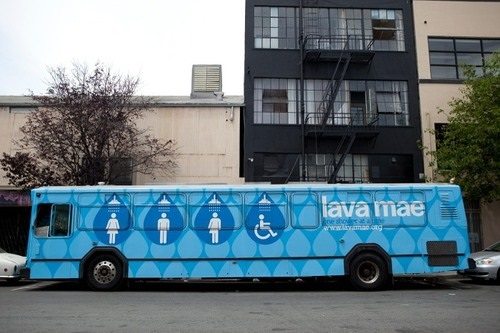
Source: Lava Mae Blog
June 25, 2014;Yahoo! News
Beginning June 28, San Francisco’s homeless population will have access to an amenity many of us take for granted: a shower. A new nonprofit, Lava Mae, has found a way to convert an old city bus into a mobile shower facility that will provide as many as 130 showers a day. While the engineering and plumbing were tricky and the city initially had concerns about how the wastewater would be handled, those problems have been resolved.
Lava Mae founder Doniece Sandoval took her inspiration from the city’s food trucks, and her motivation from the fact that San Francisco only has seven facilities with showers available for more than 6,000 homeless individuals. Most of those facilities are centrally located and therefore not accessible to many of the people who would like to use them. To see how a passenger bus was converted to a mobile shower facility, watch this video:
Sign up for our free newsletters
Subscribe to NPQ's newsletters to have our top stories delivered directly to your inbox.
By signing up, you agree to our privacy policy and terms of use, and to receive messages from NPQ and our partners.
The first bus will allow Lava Mae to test and refine the model. By next spring, the fledgling organization hopes to be operating four mobile shower buses, providing about 2,000 showers a week throughout San Francisco. And they’d love to see the concept spread to other communities, too.
“Lava Mae is not about ending homelessness,” Sandoval says. “What we are about is providing hygiene, because we believe that hygiene brings dignity, and dignity opens up opportunity.” Each visit to a Lava Mae bus will last about 20 minutes, which Sandoval notes will offer 20 minutes of both refuge and privacy—something many homeless people don’t often get to experience.
But wait, there’s more. It turns out Lava Mae isn’t even almost the only organization that has figured out how to give an old bus a second life while addressing community needs:
- Just this month, the Manatee County School District near Tampa, Florida, rolled out a former school bus that’s been refitted as a mobile lunch room to serve children who receive subsidized meals during the school year, but who might otherwise be missing out on meals during the summer months. Funded by the U.S. Department of Agriculture, “the food bus” (as its young diners call it) serves about 100 children five days a week in three neighborhoods. If all goes well, the program may be expanded next summer.
- In North Philadelphia, Portside Art Center is in the process of converting a donated SEPTA bus into a mobile arts classroom that will serve 800 children a year, supplementing the onsite offerings of this community art center in a challenged section of the city.
- EcoFriend has a page devoted to repurposed buses (including a few throwback VW minibuses). One of the buses featured is a London double-decker model that now serves as a “bicycle library” where patrons can borrow or rent bikes for short-term use.
- Still haven’t seen enough? Check out this story on Mental Floss, which shows fifteen converted school buses, including one that’s being used for renewable energy outreach education. And while many of these have been repurposed for private purposes (like an artist’s studio), one could argue that every bus converted to some practical use is one less bus in the scrap heap or the landfill.
NPQ wants to know: What other causes are being served in our sector by repurposed buses? Or, what might your nonprofit do if someone donated a bus to help you deliver your mission?—Eileen Cunniffe











